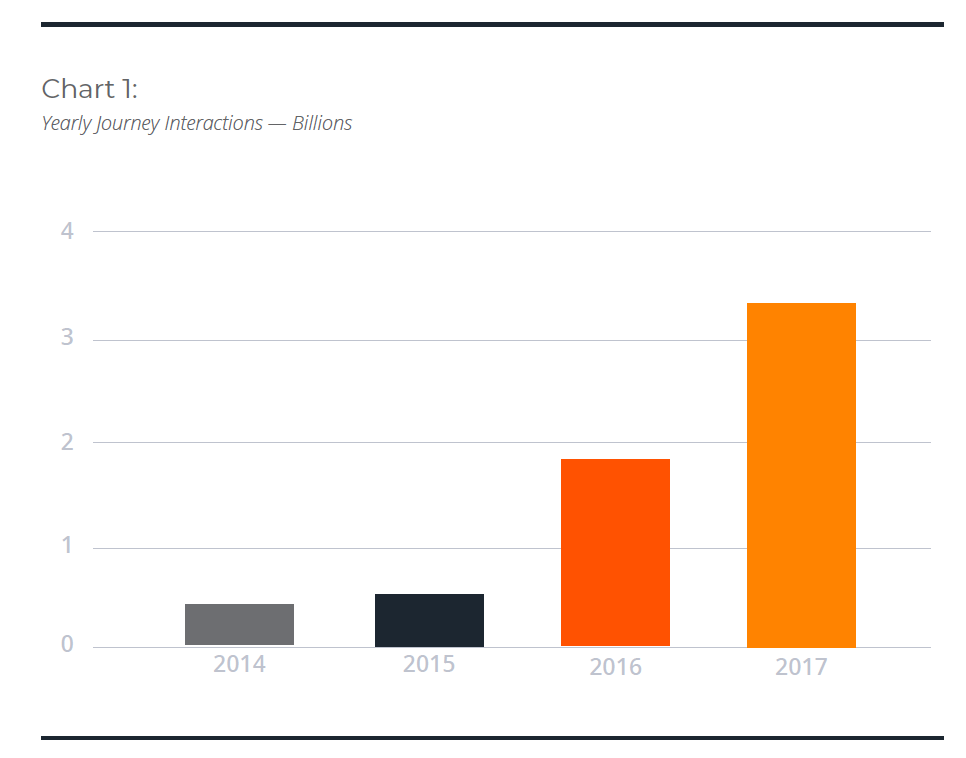Opinions expressed in this article are those of the sponsor. MarTech neither confirms nor disputes any of the conclusions presented below.
How AI is disrupting major industries
Advances in artificial intelligence tend to provoke polarizing reactions for most people. One, a dystopian anxiety where humans huddle in fear of their metallic overlords. Or two, a utopian futurist society where humans are freed from mundane labor and complex challenges are solved by machines. Wherever you fall on the AI anxiety spectrum, the fundamental […]
Advances in artificial intelligence tend to provoke polarizing reactions for most people. One, a dystopian anxiety where humans huddle in fear of their metallic overlords. Or two, a utopian futurist society where humans are freed from mundane labor and complex challenges are solved by machines.
Wherever you fall on the AI anxiety spectrum, the fundamental truth is that we are entering a major transformative cycle across nearly every industry.
While AI is currently dominated by increased media attention and business hype, the way consumers and brands interact is quietly poised to make a tectonic shift over the next two years through marketing solutions built with AI in their core DNA.
In a recent Wakefield/Demandbase study, 80 percent of marketing leaders say that AI will “revolutionize” marketing by 2020. Meanwhile, IDC research forecasts worldwide revenues for cognitive and artificial intelligence (AI) systems will reach $12.5 billion in 2017, an increase of 59.3 percent over 2016. In addition, global spending on cognitive and AI solutions will continue to see significant corporate investment over the next several years, achieving a compound annual growth rate (CAGR) of 54.4 percent through 2020 when revenues will be more than $46 billion.
On the other end of the spectrum, you have billionaire Mark Cuban stating at SXSW that “the world’s first trillionaires are going to come from somebody who masters AI and all its derivatives and applies it in ways we never thought of.”
Every enterprise from Google and Netflix to Walmart and Nordstrom is making major investments in AI. But why the shift now?
The proliferation of customer data volume via mobile devices, Internet of Things (IoT) technology like FitBits, beacons and smart appliances, and even open, public data sources have far outstripped human capability to process, generate insights and drive action.
Meanwhile, today’s consumers increasingly expect highly contextual, fluid interactions with brands, which traditional marketing automation and personalization tools can’t provide at meaningful scale. The train may be driven by data, but marketers are currently tied to the railroad tracks.
Although companies like Netflix, Google and Uber are often cited as the disruptive AI vanguard, traditional industries are increasingly adopting AI technology to help bridge the digital transformation gap and compete against industry outsiders threatening to grab market share.
Finance and the machine
The shift is already underway within banking. With banking services scrambling to meet the consumer demand for personalized online and mobile interactions, bankers believe AI will play a key role in bridging that digital gap.
Four in five bankers believe AI will “revolutionize” the way in which banks gather information, as well as how they interact with their clients, said the Accenture Banking Technology Vision 2017 report, which surveyed more than 600 top bankers and also consulted tech industry experts and academics. The report forecasts that AI will become the primary way banks interact with their customers within the next three years.
In addition, 49 percent of banking executives say the traditional transaction/ branch-based banking model will be dead by 2020, according to The Economist‘s 2016 report, “Retail Banking: In tech we trust.”
While the concern is that artificial intelligence will take away the human component to banking, the truth is that emerging AI technologies — particularly on the marketing side — allow banks to simplify interactions and only deliver the most relevant experiences for customers. Conversely, it allows financial services marketing teams to move away from mundane data and campaign processes, in favor of spending more time on creativity and innovation.
Free-to-play gaming fuels AI growth
While gaming has leveraged varying levels of artificial intelligence since its inception to simulate human characteristics in non-player characters and drive good game play, the challenges associated with the free-to-play gaming model has brought AI marketing technologies to the forefront to improve the holistic player experience.
Formerly, studios typically invested in producing big titles and gaming franchises that required an upfront purchase to play. In the traditional platform model, 90 percent of their revenue came from 28 percent of their users. However, in the mobile free-to-play market, only 6 to 10 percent of mobile gamers will make premium in-app purchases. In 2016, the average iPhone user spent $27 on games, out of a total of $40 on apps.
While studios already cared about user engagement in the previous model, the new pricing model requires a deeper understanding of how users commit to a game. Techcrunch reports that nearly one in four people abandon mobile apps after only one use.
Within this environment, leveraging in-game data to deliver personalized, real-time experiences to encourage playing time and decrease churn has become mission-critical, which has driven gaming companies to look to core AI solutions to continuously optimize the entire player experience.
AI prevents subscriber churn among mobile carriers
In the ultra-competitive and saturated telecommunications industry, major carriers are constantly stealing mobile subscribers from one another to bolster growth. Because of this, the primary players — Sprint, Verizon, T-Mobile, and AT&T — are heavily investing in emerging AI solutions to help predict and prevent customers leaving for another carrier (called churn within the industry).
Traditional offline predictive models are unable to provide an in-depth view at the velocity needed to actually prevent churn. New AI platforms are allowing mobile carriers to understand the behavioral signals for a customer at risk for churn weeks earlier and take preventative action to course correct the customer relationship with the brand (provide new data or pricing incentives, encourage engagement, or create enticing renewal offers).
Because of the pace of the industry, the sheer volume of data available and its position as a conduit for all mobile experiences, telecommunications is a leading candidate for the industry poised to see some of the greatest return on investment from AI technology.
Humans welcome
While the prevailing concern around automation focuses on job replacement, we’re actually seeing a surge in creativity and innovation as overloaded marketers and data scientists are freed from the manual labor of wrangling data and building complex targeting rules. Customers should expect a creative surge over the next two years from brands they interact with as the focus shifts from traditional marketing technology to core AI solutions.
And no matter where you fall on the AI anxiety spectrum, increased creativity ultimately results in not just a better customer experience, but a better human one.
Related stories



